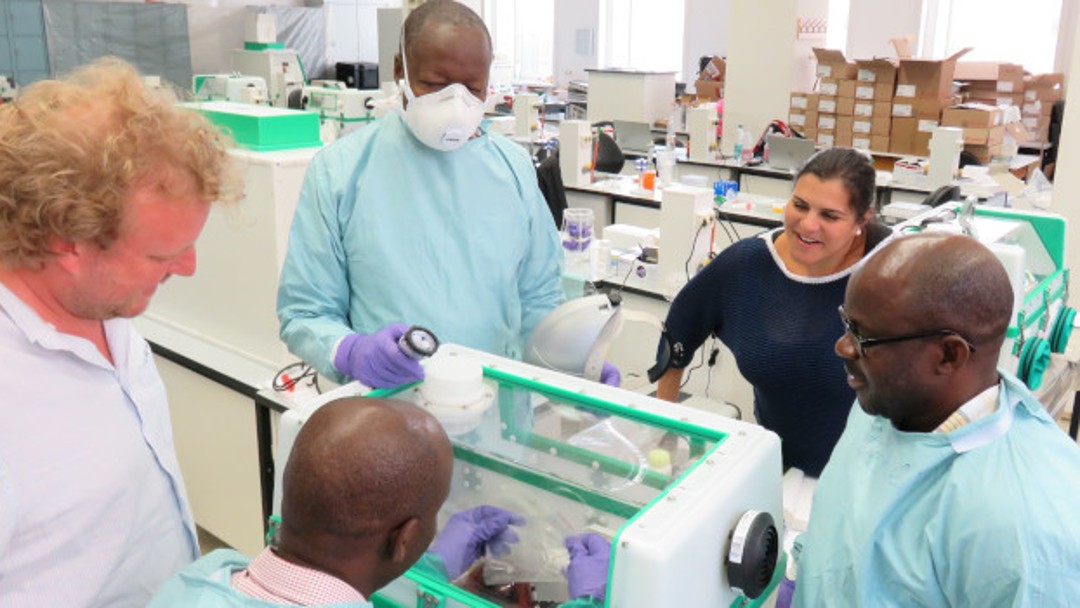News from 2019-02-26 / KfW Development Bank
Combating pandemics: the next outbreak is sure to happen

Over 11,000 people lost their lives in the Ebola epidemic in West Africa. This outcome would have been less devastating if cases of illness had been identified earlier and measures had been taken to prevent infection with the highly contagious virus. After the disease reappeared in the Democratic Republic of Congo in the middle of last year, it is now all the more important that decisive action is taken. Because the outbreak poses a threat for neighbouring countries: it took place in a particularly densely populated region of the Congo, and there is a high risk that the disease could spread across the borders.
Now German aid is being used to counteract this. A project that KfW is promoting with funds from the German Federal Ministry for Economic Cooperation and Development (BMZ) intends to actively prepare the six countries in the intergovernmental organisation of the East African Community (EAC) to better monitor and combat epidemics. To this end, nine mobile, high-tech laboratories are being provided and specialists are being trained in their operation. The project is receiving support from the Bernhard Nocht Institute for Tropical Medicine (BNITM), which is organising the laboratories' delivery and training of the laboratory specialists with three permanent consultants located in the EAC in Arusha, Tanzania.
Prof. Joachim Nagel, Member of the Executive Board of KfW Group and responsible for KfW Development Bank was visibly impressed as he visited the project sites: "Viruses and epidemics know no borders. So a regional approach to containing pandemics makes absolute sense." Together with further project participants, he witnessed a demonstration of the complex procedures for laboratory operations in Arusha. One particular challenge here is that the many partners and experts from different countries have to network well – an essential prerequisite if combating pandemics at a regional level is to work.
So Prof. Nagel was particularly pleased about the good progress in areas such as the qualification of national laboratory personnel. Two people each from Burundi, Kenya, Rwanda, South Sudan, Tanzania and Uganda have already completed a training programme lasting several weeks at the Bernhard Nocht Institute in Hamburg. The training was not only about how to use and operate the mobile laboratories with state-of-the-art molecular biological diagnostic procedures, but also primarily about safety measures to protect themselves against infection. "It was astounding how fast the various regional teams were able to work well together, support each other and complement each other. At this first training course in Hamburg, we were able to see that the objective of the EAC countries to organise measures to combat pandemics at a regional level can truly be realised," said Dr Florian Gehre from BNITM about the promising results. Further training and field exercises are planned for May and June, this time in Arusha. Then, with technical assistance from BNITM, each regional team will instruct two additional colleagues in the complex laboratory tasks. This is because four specialists are necessary for each of the mobile laboratories, which are expected to be delivered in the second half of the year. Moreover, the qualification measures will be continued afterwards so that 12 laboratory specialists per country will be ready to work in the medium term.
German Financial Cooperation will also be further expanded – Phase II is being prepared and is expected to be contractually finalised by the end of the year. The focus here is on monitoring antimicrobial resistance, supported by delivery and installation of the necessary equipment and qualification of operating staff.

Share page
To share the content of this page with your network, click on one of the icons below.
Note on data protection: When you share content, your personal data is transferred to the selected network.
Data protection
Alternatively, you can also copy the short link: https://www.kfw-entwicklungsbank.de/s/enzBWrMC.B8XA
Copy link Link copied